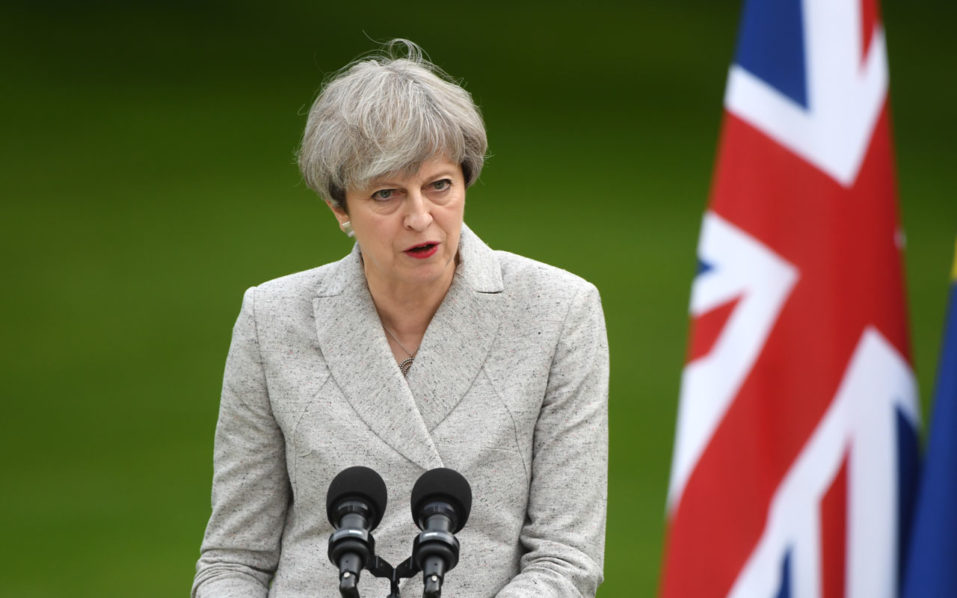
British Prime Minister Theresa May’s Conservatives have reached a “broad agreement” with the ultra-conservative Democratic Unionist Party to prop up her minority government, a source told AFP on Thursday after her election fiasco.
The Conservative source said talks with the small Northern Irish party were progressing well ahead of meetings later Thursday in Downing Street with all of the British province’s main political leaders.
Both parties are committed to a strengthening British unity, delivering Brexit, combating terrorism, and delivering prosperity, the source said, adding however that “at the moment there isn’t a deal”.
The government meanwhile said the state opening of the British parliament — when May’s government presents its legislation programme — will take place on June 21, two days later than planned.
A Conservative source said this meant the party was “confident” it had enough votes for the programme to be approved, after May suffered a disastrous setback in snap elections a week ago that saw her lose her majority in the 650-seat House of Commons, just ahead of crucial Brexit negotiations with Brussels.
The Conservatives, who have 317 MPs, are looking to strike a deal with the DUP, who have 10.
The prospect of a deal between the two parties has caused disquiet, with the DUP’s anti-abortion and gay rights stance in the crosshairs.
Though on the surface, Thursday’s meeting with Northern Irish parties is aimed at breaking the logjam in forming a new cross-party regional government in the province, May needs broader acceptance of a Conservative-DUP deal.
And some fear the viability of Northern Ireland’s fragile peace — which has held since 1998 after decades of inter-community violence known as The Troubles — could rest on the arrangement, with doubts around the UK government’s neutrality.
“The main concern is going to be that if there is a Conservative-DUP deal, then can the British government continue to play the role of a honest broker in the restoration of a Northern Ireland executive?” said Simon Usherwood, senior politics lecturer at Surrey University.
“The risk is that Northern Ireland continues to fail to find solutions, and potentially the peace process unwinds,” he told AFP.
Collapse of trust
The 1998 peace accords in Northern Ireland set up a power-sharing agreement in the British province, but this collapsed in January when Irish republicans Sinn Fein pulled out, citing a breakdown in trust.
An election in March saw the pro-British, Protestant, conservative DUP finish narrowly ahead of Catholic socialists Sinn Fein.
If the parties cannot agree a deal, then devolution will be suspended and the Northern Irish assembly’s powers returned to the UK government.
Talks restarted on Monday in Belfast, under Britain’s Northern Ireland Secretary James Brokenshire.
“There is very little time left. An agreement to restore devolved power-sharing government in Stormont must be reached by the June 29 deadline,” he said.
The DUP and Sinn Fein are taking part in Thursday’s talks at Downing Street, along with smaller parties.
Michelle O’Neill, Sinn Fein’s leader in Northern Ireland, said any deal between the Conservatives and the DUP “cannot be allowed to undermine” the province’s peace accords.
Brexit complications
Brexit is another complicating factor in the mix. A majority in Northern Ireland wanted the UK to remain in the European Union, though the DUP backed a divorce from the bloc.
Northern Ireland’s frontier with the Republic of Ireland will be the UK’s only land border with the EU after Brexit.
[ad unit=2]
London, Belfast, Dublin and Brussels all want to keep the border open, but no agreement has been reached.
“The two issues — Northern Ireland and Brexit — might end up making the other more difficult, in a vicious circle,” Usherwood said.
“This will continue as long as no one is able to find a workable solution for the border issue.”



